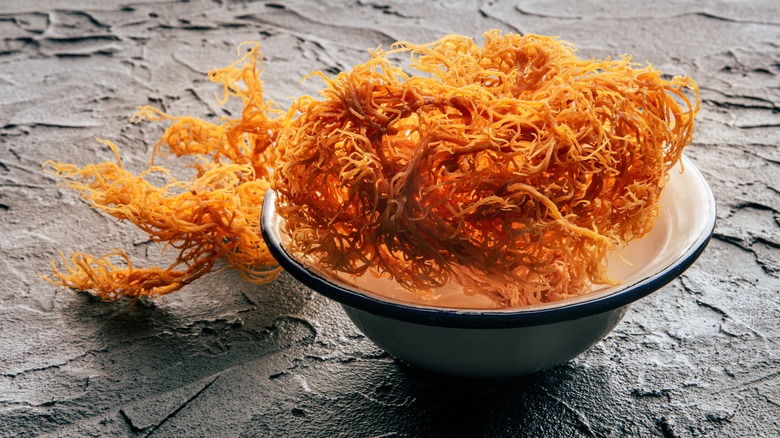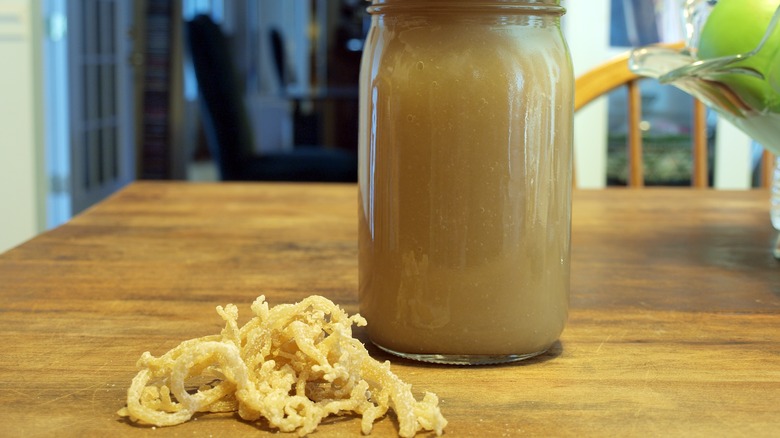What Sea Moss Can (Or Can't) Do For Your Health
Some of the most nutrient-rich foods come from the sea, such as heart-healthy salmon, tuna, and mackerel. The sea also offers some healthy plant-based foods like seaweed that are rich in iron, magnesium, and iodine.
Sea moss, also known as Irish moss, grows mostly on the Atlantic coasts of North America, the British Isles, and Spain. It is harvested for its thickening agent carrageenan that's used in ice cream, toothpaste, and shoe polish. Wellness influencers also tout the health benefits of sea moss gel to boost libido, get rid of mucus, improve sleep and mental health, and regulate blood pressure, just to name a few. However, there isn't much research that supports these claims.
Sea moss does have fiber and oligosaccharides that might be able to improve your gut health, according to a 2015 article in BMC Complementary and Alternative Medicine. Researchers fed a standard diet and a diet enriched with sea moss to lab rats and found that sea moss increased the good bacteria in their gut while reducing harmful bacteria. As a result, the sea moss increased the amount of short-chain fatty acids that improve gut health and the immune system. Sea moss also has bioactive components that can fight free radicals and reduce oxidative stress.
Other health benefits of sea moss
A 100-gram serving of sea moss has just 49 calories but provides almost half your daily recommended iron and 34% of your magnesium. Like other seaweeds, sea moss also provides iodine, which is a key mineral your body needs to produce the thyroid hormone. Sea moss is also rich in the B vitamins riboflavin and folate.
You might also like sea moss for its antioxidants. In a 2013 study in the Journal of Functional Foods, researchers used a sea moss extract to test the antioxidant power of worms. The worms were able to tolerate stress from a harmful chemical and had lower levels of harmful molecules. The researchers said the sea moss has fatty acids and other nutrients that protect against oxidative stress.
Sea moss's ability to protect the body from oxidative stress might help protect the brain from neurodegenerative diseases, too. A 2015 study in Marine Drugs also used worms to test sea moss against Parkinson's disease. Sea moss extract reduced the buildup of a harmful protein associated with Parkinson's and protected the nerve cells from damage. The sea moss also activates specific genes that protect against stress. A 2024 review in Marine Drugs outlined the potential for sea moss and other red seaweeds to have anti-inflammatory, antiviral, and anti-cancer properties, but research is still at the cellular and animal stages.
Some risks of sea moss
Your body can't produce iodine, so you have to get it from food. Adults need at least 150 micrograms of iodine, and the upper limit for iodine is 1,100 micrograms. A 100-gram serving of dried sea moss has 24.5 milligrams, which is 163 times more than you need. Too much iodine in your system can lead to thyroid cancer or inflammation of your thyroid gland. It might also cause burning in your throat or gastrointestinal issues. Sea moss capsules might have only 120 milligrams of sea moss, so iodine overload might not be a concern with supplements. Sea moss gels often have juices and sugars added, so it's not clear how much sea moss you're getting in a 28-gram serving of these.
Sea moss might have other health risks such as liver injury. A 2023 case study published in The American Journal of Gastroenterology described a 44-year-old woman who had high levels of liver enzymes and other liver-related markers. Although she was taking medication to control cholesterol and blood clotting, she said she drank smoothies made with sea moss. The doctors believed that the carrageenan found in sea moss activated killer immune cells that released molecules that damaged her liver. Carrageenan is generally safe, but it could trigger inflammation, food allergies, or gastrointestinal issues.


